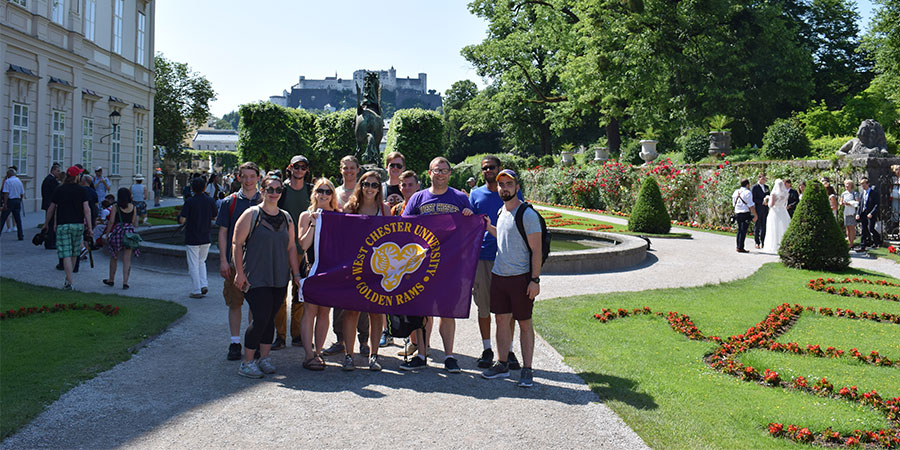German Undergraduate Program - Herzlich Willkommen in der Germanistik Abteilung!
The German Program
The German language concentration is part of the Bachelor of Arts in Languages and
Cultures (BALC). We offer both a major and minor option in our German program:
- The German language major consists of any 10 courses in German, a second language requirement of 4 courses (through
the 202 level), a course in linguistics and another course in a content area related
to the major.
- The German language minor consists of any 6 courses in the language. You can start your minor with GER 101 or
higher, for a total of 6 courses, taken in consultation with the program advisor.
You can also complete the language requirements for another departmental major with
our German courses, including 101-202 and/or German culture cluster courses.
Careers with German
Interested in what you can do with German? Watch an interview with our alumna Adelaide Okonski.
Course Offerings
For a complete list of courses, consult the official Course Catalog.
- We offer the following courses every semester as well as in the summer:
- GER 101 & 102 (first year)
- GER 201 & 202 (second year).
- We offer several German Culture Cluster courses in English (please note these do not
count toward the major or minor in German):
- EGE 323: Austrian Civilization
- EGE 403: 20th Century German Masterpieces
- EGE 404: Postwar German Literature and Film
- EGE 405: A Survey of German Film
- EGE 408: Masterpieces of Modern German Theater
- EGE 409: Impact of the Holocaust on Literature and Film
- You can take the following courses in German during the fall or spring semesters,
as scheduled:
- GER 303: Advanced German Grammar and Composition: A review of the grammatical and syntactical
structures of the language with an emphasis on writing style.
- GER 307: Advanced Oral German: Intensive drill in the oral use of the language to develop proficiency
in listening comprehension and speaking.
- GER 310: Business German.
- GER 315: Developing Proficiency.
- GER 322: Austrian Civilization: Turn of the Century Vienna: An examination of the politics
and society of the period as well as its contributions in the arts, psychology, literature,
music and philosophy.
- New GER 325: Course topics include: an overview of the historical development of Germanic languages,
including Dutch, English and Scandinavian languages and distinct dialects such as
Swiss & Austrian dialects, Bavarian, and Yiddish; and the use of German in an international
context, in literature, the youth culture, and in contemporary media.
- GER 350/351: German Civilization: An analysis of the major contributions of German civilization
to Western culture in the areas of art, music, science, and literature from the Middle
Ages to the present.
- GER 401: The Age of Goethe: Masterpieces of the Enlightenment, Sturm und Drang, and Classicism.
- GER 403: 20th Century German Masterpieces. An in-depth analysis of the works of Franz Kafka,
Thomas Mann, Hermann Hesse, Gunter Grass, Heinrich Boell, Christa Wolf, Herta Mueller,
and W.G. Sebald.
- GER 404: German Artists as Social Conscience: Postwar German Literature and Film: An examination
of the political and social issues of postwar Germany through an analysis of literary
and cinematic texts. Topics include: the Holocaust, Nazism, WWII, the Economic Miracle,
terrorism, the feminist and peace movements, reunification.
- GER 405: A Survey of German Film: An analysis of German films from Expressionism to the present.
Films are examined in terms of their political and social context and as works of
art.
- GER 407: German Lyric Poetry: Modern German poetry.
- GER 408: Modern German Drama.
- GER 410 and GER 411 are advanced topics seminars.
- GER 413: Impact of the Holocaust on Literature and Film
- And our new graduate courses in German:
- GER 500 20th Century German Culture
- GER 505 Survey of German Film
- GER 508 Modern German Theater
- GER 525 German Linguistics
Study Abroad Options and Student Activities
We encourage our students to study abroad in Vienna, Austria during summer session I. The WCU Vienna German-language Immersion Summer Program, under the direction of Dr. Joseph Moser, offers students the possibility of earning up to 6 transfer credits during a four-week
intensive immersion program.
Financial assistance for study abroad is available on a competitive basis through several departmental awards.
You can consult the German Study Abroad page for more information.
German Club activities include group get-togethers in German with the German Club Advisor, Dr. Joseph Moser, and trips and other cultural activities.
Certification
Students can also obtain Pennsylvania K-12 teaching certification in German, in conjunction
with the College of Education here at West Chester University. You can consult the
Certification page for further information and requirements.
WILLKOMMEN ZUM GERMANISTIK PROGRAMM DER UNIVERSITÄT WEST CHESTER!

